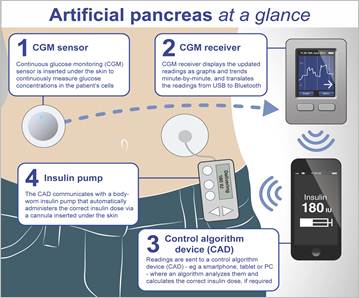Product development firm Cambridge Consultants today announced that it is working with the Institute of Metabolic Science (IMS) at Addenbrooke’s Hospital in Cambridge, UK on groundbreaking research to create an artificial pancreas.
The hospital’s research, led by Dr. Roman Hovorka, aims to reduce the complications of type 1 diabetes and dramatically improve the lives and life expectancy of millions of people with the condition. Research from the International Diabetes Federation shows the US ranked sixth highest in the world for the rate of children aged 14 and under diagnosed with type 1 diabetes, and a particular concern is the risk of people who have it slipping into dangerously low blood sugar levels in their sleep.
Cambridge Consultants is developing an application that will allow a continuous glucose meter (CGM) to autonomously communicate with a smartphone or tablet via Bluetooth and then link to an insulin pump – creating an artificial pancreas that can be worn by people with type 1 diabetes at home without nurse supervision. The CGM will monitor the patient’s glucose levels every 1-5 minutes, with the information generated passed on to a connected smartphone or tablet that will calculate the amount of insulin the patient needs to keep their glucose at a steady level 24/7. The recommended dosage will then be automatically delivered to the patient via the pump worn under their clothing.

While a nurse-assisted system has previously been trialed in a hospital setting and home use of the system has already been established, the application being developed by Cambridge Consultants provides Dr. Hovorka with the equipment needed to trial his new algorithm in a home environment over a longer time period.
“Researchers in my field have been working on a number of different algorithms for an artificial pancreas but, with the help of Cambridge Consultants, I hope to create a system that is convenient to use and can be remotely monitored,” said Dr. Hovorka, director of research at the University of Cambridge Metabolic Research Laboratories, which are part of the IMS. “My previous trials were nurse-supervised in a hospital setting and also included unsupervised home use of the system. Trialing the system in a natural setting over a longer time period is the next stage in making the system widely available. To do this, it must work completely autonomously. Combining my background in mathematical modeling and developing control algorithms, and Cambridge Consultants’ extensive experience in medical technology and connected devices, we hope to make a huge breakthrough in the day-to-day control of this incurable condition.”
Rob Milner, technical leader of the smart systems team at Cambridge Consultants, said: “There’s been a huge surge in health and fitness mobile apps in recent years and we’re now looking to take Dr. Hovorka’s research to the next level. Our mission is to create technology that helps people with type 1 diabetes better manage the condition they have to live with every day. The real benefits will be in the improved health of people with the condition.”
Aaron Kowalski, vice-president of treatment therapies at the type 1 diabetes charity JDRF, said: “There is a pressing need for improved treatments for people with type 1 diabetes and we are proud to be funding Dr. Hovorka’s important research trials, including the recent trial of the system in children at home. The incidence of type 1 diabetes among children is increasing by at least four per cent year on year and the complications associated with the condition can be debilitating.
“An artificial pancreas may reduce complications such as heart and kidney disease, blindness and stroke, but would also ease the burden of the condition carried by people with type 1 diabetes and their families every day. We see the damage caused by hyperglycemia and low blood glucose levels on a day-to-day basis, and artificial pancreas systems can’t come soon enough.”
Dr Alasdair Rankin, director of research for Diabetes UK, said: “Research into an artificial pancreas is at the cutting edge of diabetes research and has enormous potential to improve both the quality of life and also the health outcomes for people with type 1 diabetes.
“Managing blood glucose can be really difficult, and barely a quarter of people with type 1 diabetes are reaching the recommended levels. High blood glucose levels increase the risk of developing devastating health complications such as amputation and stroke, and this means Dr Hovorka’s work has the potential to make a big impact.”
Dr. Hovorka’s in-home longer-time trial is due to start later this year. For more information, visit: www.CambridgeConsultants.com
Advertisement
Learn more about Cambridge Consultants





